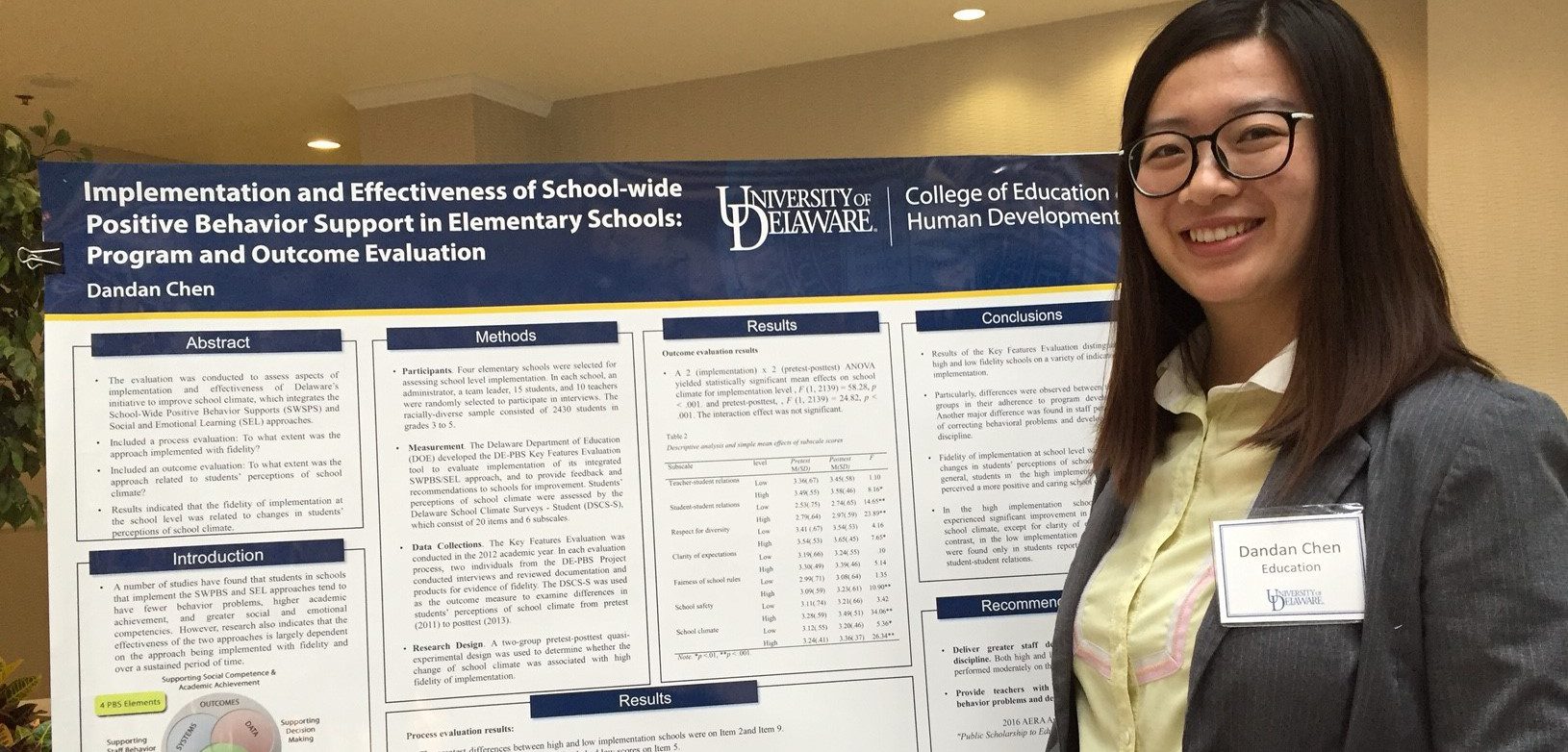School of Education
Ph.D. in Educational Statistics and Research Methods

The Ph.D. in Educational Statistics and Research Methods (ESRM) prepares students interested in education data science, research methods, statistics, causal inference, psychometrics, and evaluation to develop, critically evaluate, and properly use sophisticated quantitative and mixed methodologies to solve important problems in education.
The Ph.D. in ESRM is a STEM-designated degree program.
Many of our ESRM students and faculty are affiliates of the Data Science Institute, where they participate in seminars, courses, and research projects. ESRM students may elect to earn their Master of Data Science or Masters in Applied Statistics along the way to their PhD in ESRM.
Students will:
- Design research projects, focusing either on advancing research methodologies or on applying advanced methods to education issues
- Develop assessment instruments
- Implement program evaluation
- Understand psychometric theory, as well as technical issues underlying construction and use of tests for selection, placement, and instruction
- Develop skills in advanced statistical modeling using a variety of software
- Examine how these statistical models are applied to areas such as school effectiveness, economic and social stratification, the structure of human abilities, and achievement growth
Doctoral students also present research at conferences, collaborate with faculty on peer-reviewed publications, engage in the work of interdisciplinary research centers through graduate assistantships, and learn in an environment with small class sizes and supportive faculty.
Our graduates accept tenure-track or research faculty positions in research universities as well as research positions in state departments of education, school districts, and organizations such as the Educational Testing Service, Pearson, and Mathematica.
Program Faculty
Coursework
- Core Content Courses: Core coursework includes two Proseminars (EDUC 805, EDUC 806) that students take in the first two semesters of their program. These courses introduce the key domains of education research, examined through qualitative and quantitative data collection methods and analyses. Topics include learning and development, curriculum and instruction, school reform, and social contexts of education. These courses also allow students to interact with PhD in Education students across all 6 specializations and PhD in Economic Education students.
- Research Methods Core Courses: Students take 15 credits of research methods core courses, including EDUC 856: Introduction to Statistical Inference, EDUC 812: Regression and Structural Equation Modeling, EDUC 865: Educational Measurement Theory, EDUC 874: Applied Multivariate Data Analysis, and EDUC 850: Qualitative Research in Educational Settings. These courses combine sophisticated theory with practical application, beginning with an introduction to statistical inference and extending to structural equation modeling, multiple regression, and the use of applied multivariate data analysis.
- Additional Required Methods Courses: Students take 9 credits of additional required methods courses, including EDUC 826: Mixed Methods in Social Science Research, EDUC 863: Program Evaluation in Education, and EDUC 873: Multilevel Models in Education.
- Elective Methods Courses: Students take 3 or more credits of additional elective methods courses. Topics include Advanced Structural Equation Modeling, Bayesian Analysis and Monte Carlo Simulation, Causal Inference, Data Mining in Education, Experimental and Quasi-Experimental Design, Item Response Theory, Longitudinal Data Analysis, Randomized Field Trials, Secondary Analysis of Large-Scale Survey Data, and Social Network Analysis.
- Education Specialization Courses: Students take 6 additional credits of content courses from a specialization area within the PhD in Education. View specialization courses online.
- Colloquium Series Course: A one-credit course (EDUC 840) is offered each semester in conjunction with the colloquium series, and students complete a minimum of 4 credits of colloquium. The research colloquia introduce students to the foremost thinkers and researchers in the field of education. Guest scholars are invited to share their research findings with doctoral students and faculty in a setting that encourages collegiality and familiarizes students with a number of scholarly presentation styles and content areas.
- Dissertation credits: Nine hours of dissertation credit (EDUC 969) is required of all PhD students, and additional coursework may be specified by a student’s advisory committee as part of the student’s Individual Program Plan.
- Total credits: A minimum of 55 credit hours is required to complete the program.
Download a sample student schedule for this program or view the schedule of course offerings.
Apprenticeship Activities
All of our PhD students are offered full funding for four years. Funded students participate in a 20-hour a week assistantship where they work closely with one or more UD professors, and have opportunities to learn and practice multiple methodologies, analyze data, and co-author academic papers. All students participate in the Steele Symposium, an annual college research forum; submit a publication to a peer-reviewed journal on which they are a coauthor; present their work at a national conference; and develop skills in university teaching.
Residency
Most of our students are in residence for all four years of the program (assistantships typically require residency, though there are exceptions). Students are required to complete at least one year in residence (one continuous academic year with 9 credit hours per semester). Students are strongly encouraged to complete this requirement in the first year.
Examinations
All students must pass an assessment based on the work completed in the Proseminars at the end of the first year. After students successfully pass the First Year Assessment, they may enroll in second-year courses. This First Year Assessment fulfills the University requirement for a qualifying examination.
Students must also pass the Fourth Year Exam in order to proceed to the dissertation. The exam assesses student proficiency in integrating various aspects of research methodology to address substantive issues in education.
Dissertation Proposal
Students complete a written proposal for their capstone dissertation project and defend it orally before their advisory committee.
Dissertation and Defense
Students complete a dissertation, an original work of scholarship, meeting SOE, College, University, and professional requirements. They also complete an oral defense of the work before their advisory committee.
Program Policy Document
Students may download the program policy document for complete information about this degree.
The MA in Education provides a master’s degree option for PhD students in good standing who want to obtain a master’s degree in conjunction with their doctoral degree, or for students in good standing who must leave the doctoral program prematurely because of family, health, or personal reasons. Students will not be admitted directly to the MA program, since the program requirements are embedded within the PhD requirements.
To apply to the PhD in ESRM program, complete the steps of the UD online graduate application process.
Application Requirements
Some application items specific to the PhD in ESRM program include:
- Transcripts of all previous academic work at the undergraduate and graduate (if applicable) level. Applicants may upload unofficial copies of their transcripts and if admitted, all transcripts will be verified by the Graduate College. Applicants who previously attended the University of Delaware still need to upload an unofficial transcript, but do not need to provide official transcripts for verification. Please do not send any transcripts to the School of Education.
- GRE scores are required. Students typically are expected to have minimum scores of 150 on the verbal and quantitative sections and a 4.0 on the analytic writing section. Most admitted students have far higher than the minimum scores. The GRE is optional for Fall 2026 applicants. Please see the note at the top of this section.
- Three letters of recommendation are required. Applicants should select recommenders who can comment on their potential to succeed in doctoral work.
- A personal statement in the essay section of the application is required.
- Applicants should introduce themselves and discuss educational and career goals related to the Ph.D. in Educational Statistics and Research Methods program and how this program is a good match for their interests.
- Applicants should identify their area of specialization and potential research interest and describe which two faculty in their specialization area they would be interested in working with and why.
- The personal statements should be 2-3 pages in length.
- A resume is required.
- No writing samples or supplemental documents are required.
- International applicants must submit scores from either the TOEFL, IELTS, or iTEP Academic Plus. Scores more than two years old cannot be validated or considered official. Required minimum scores for the TOEFL is 100. For the IELTS, the minimum score is 7.0. For the iTEP Academic Plus, the minimum score is 4.5.
Application Deadline
The deadline for all applications is November 15 for study beginning the following Fall term.
In general, it is not possible to take required core courses before becoming admitted. The required core courses are generally restricted to students already admitted into the program.
Our full-time Ph.D. students are typically funded for up to four years, and many complete their degree during this time period. Funding packages for Ph.D. students include a monthly stipend, tuition scholarship, health insurance and some conference travel to present papers. Ph.D. students are also eligible to be nominated for several college and university competitive merit-based financial awards. Funding to continue research apprenticeships during the summer may also be available.
For more information about this financial support, visit CEHD’s graduate tuition page.
Full-time Ph.D. students may qualify for financial aid, assistantships, scholarships, and loans to help offset the cost of tuition, housing, and other expenses.
Scholarships and assistantship awards are subject to availability. Information is subject to change.
Graduates of this STEM-designated degree program will be well prepared for careers in applied education research in several arenas in both the for-profit and non-profit sectors, such as:
- Tenure-track or research faculty at Research-I universities
- Research/evaluation staff at national research organizations (e.g., Abt, AIR, Mathematica, MDRC, RAND, Westat)
- Research/evaluation staff at local research organizations (e.g., Research for Action, Branch Associates, Research for Better Schools)
- Research/psychometric staff at national measurement organizations (e.g., College Board, CTB, ETS, Harcourt/Riverside, Pearson)
- Research/evaluation Staff in federal agencies (e.g., Institute of Education Sciences) and regional agencies (e.g., REL Mid-Atlantic)
- Research/evaluation Staff at local school districts and state education agencies

How to Apply
Applications for all graduate programs at the University of Delaware are done online through the UD Graduate College. To apply to the PhD in ESRM program, complete the steps of the UD online graduate application process. For information about graduate tuition, visit UD’s graduate tuition page for CEHD programs.
Student Spotlight

Kati Tilley
“Through my assistantship, I have gained critical experience in communicating research findings. One of the most valuable experiences I have had was learning to write and present results to a non-academic audience. I led the development of an individualized report of survey results and presented them in person to the schools who participated in our study.”












